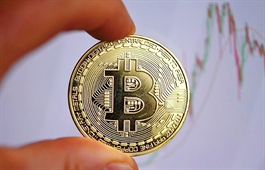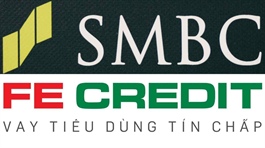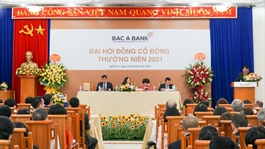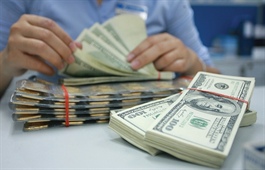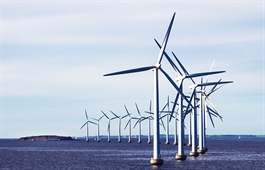Multiple financial risks still challenge Vietnam
Multiple financial risks still challenge Vietnam
Global financial markets have been negatively hit and significantly shaken by the ongoing unpredictable, relentless and complicated developments under the Covid-19 pandemic, leading to continued global financial instability.
Illustrative photo.
|
Although the major risks to the global financial markets have been identified and cautioned, there still remain potential risks, as a sudden unexpected rise of the pandemic may reoccur at any time, or the pandemic may even continue unabated for very many years to come. Vietnam too needs to be well prepared to face unforeseen challenges brought about by the virulence of the Covid-19 pandemic.
Global financial risks
The first biggest risk confronting global financial markets is the debt volatility risk, which also includes government as well as corporate debt. In 2021, although public debt and fiscal deficit are not as large as in 2020, they will still remain high, especially in developed countries, causing global debt burden to continue to rise to 365% to 370% of GDP. The default rate of Chinese corporate bonds is forecast to increase by 10% to 30% in the period of 2021 to 2022. Indirect investment inflow (FII), although more stable since the end of 2020, is still at risk of a decline in 2021 to 2022.
According to IMF forecast of April 2021, if the progress of vaccine supply worsens, the FII capital flow will decrease by about 25% compared to 2020. With a high debt risk and when interest rates rise, market liquidity decreases, debt repayment obligations increase, and there is unpredictable financial burden and risk, especially in developing and emerging countries, which are more vulnerable and have more difficulty to access the Covid-19 vaccine.
 |
The second big risk is the uncertain and uneven recovery of the global economy, causing increased financial risks. The economic and health crisis caused by the Covid-19 pandemic has led to a decline in global economic growth by -3.3% in 2020, the lowest level since 1930. The current recovery momentum is forecast at 6% in 2021 and 4.4% in 2022, according to the International Monetary Fund report in April 2021.
However, economic recovery depends heavily on the development, supply, distribution, and number of vaccination counts of the Covid-19 vaccine on a global scale. According to CitiResearch in February 2021, the vaccine will help global GDP grow by 4.1 percent in the period of 2021 to 2022 from improved public health, control of the disease, and through boosting investment demand, trade and consumption. However, the distribution of vaccines is facing many difficulties. This has slowed down the economic recovery momentum, which can further increase financial risks.
The third risk is of institutions failing to keep up with the development of financial markets, or find effective disease response solutions and coordination mechanisms. Institutions also face many uncertainties and challenges, such as the development of digital economy and digital finance.
The fourth risk is the growing financial crime worldwide. According to Cyber Security Software Company (McAfee) and Center for Strategic and International Studies (CSIS), cybercrime causes the loss of 1.2% global GDP, which was about USD 1 trn loss in 2020, a 50% increase compared to 2018. Besides many other intangible damages, financial crime has increased sharply in the context of the Covid-19 pandemic. According to EMR Consulting Company, the global financial crime management and control market is worth about USD 1,100 bn, and is forecast to increase by 5.7% per year in the period 2021 to 2025.
Challenges for Vietnam
Several risks and challenges are expected to confront Vietnam, and impact its financial system. The first will be financial risk, although Vietnam has been highly successful in its disease control strategy, and had the highest economic growth in the world in 2020, the risk level of the Vietnamese financial market is rated average. This average rating has potential to turn into a state of higher risk unless dealt with effective measures.
The risks in Vietnam's stock market are relatively high due to its small size, fewer commodities, low transparency, and high level of volatility among individual investors. In addition, the Vietnamese banking sector is always under pressure to increase capital, due to a thin capital base, while credit and investment is quite high, at about 14% per year in the past ten years. The risk of bad debt may also increase by 2.5% to 3% by the end of 2021. This requires responsibility to set up additional risk provisions for three years from 2021 to 2023, as per Circular 03 dated 2 April, 2021.
 |
The second big risk could be challenges that lie within the Vietnamese economy. Although positive economic growth has been achieved in the context of the current global recession, the Vietnamese economy is still facing five major internal challenges, namely, low growth quality, competitiveness, and restructuring; competition pressure and legal risks in the integration process; results of three strategic breakthrough polices covering institutions, human resources and infrastructure that have not yet met expectations; an aging population that is affecting the quality of human resources; and climate change issues as Vietnam is one of six countries most severely affected.
The third risk is that of institutional progress contributing to improving the economy and the financial system, but is still slow. Although now specialized laws governing the finance-banking sector are being standardized and perfected as per international practices, there lies problems in institutional development especially in digital economy, where new business models are too slow compared to actual requirements. Financial risk management capacity and transparency of investments are still a big challenge in the rapid development of digital economy, and digital finance and currency.
The fourth risk pertains to financial crimes in the Vietnamese banking and finance sector that have become a rather challenging issue. According to Viettel network security company, in August 2020, 90% of the three million cyber-attack warnings were aimed at the Vietnamese financial and banking system. As the financial-banking crime prevention operations still face many challenges due to limitations in management capacity, many security holes need to be promptly fixed. The number of fraudulent attacks on bank account appropriation are also forecast to increase.
The fifth risk is the challenge of developing green finance and green banking. As a country heavily affected by climate change, the trend of green development has become indispensable in the financial economy of Vietnam. Attention has been paid to building the legal system on green finance, especially the National Strategy on Green Growth under Decision 1552/QD-NHNN dated 6 August 2015 and Decision 1604/QD-NHNN dated 7 August 2018. However, Vietnam's green finance has not really become an investment and development trend and is still facing many challenges such as the legal system, or green finance, which is still in its infancy. According to RobecoSAM, a consulting firm specializing in sustainable investment, Vietnam is one of the ten countries with the lowest ESG index.







